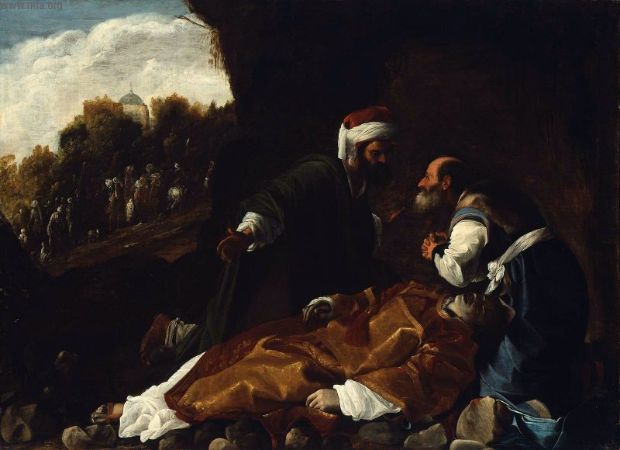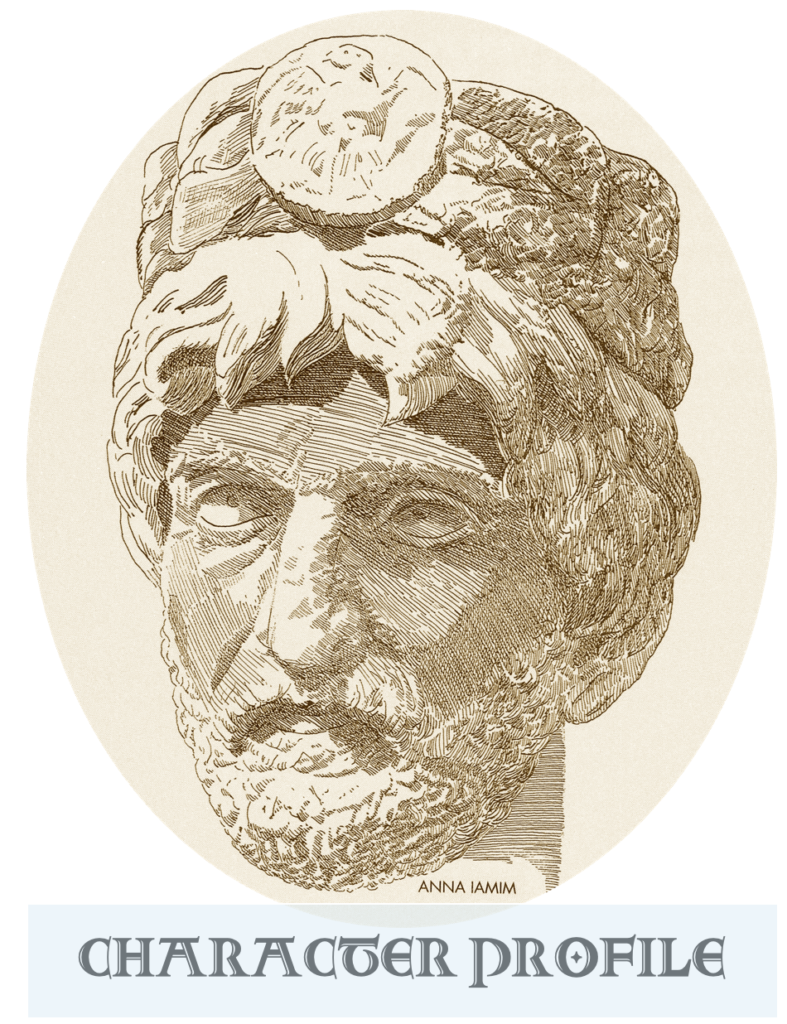Gamaliel

The Pharisee Gamaliel is mentioned twice in the New Testament (Acts 5:34; 22:3). In Acts 5:34 he appears as an advocate of the nascent congregation of Jesus’ disciples in Jerusalem and is called “a Pharisee, a teacher of the Law, held in honor by all the people.” Then, in Acts 22:3, Paul says that he was “brought up in this city [Jerusalem] at the feet of Gamaliel.” Indeed, Gamaliel was an important spiritual leader of the Pharisees and a Jewish scholar. He also is well known from Jewish sources.
| Rather listen instead? |
| JP members can click the link below for an audio version of this essay.[*] Paid Content If you do not have a paid subscription, please consider registering as a Premium Member starting at $10/month (paid monthly) or only $5/month (paid annually): Register One Time Purchase Rather Than Membership  |
The Pharisees were one of the three main Jewish parties in the first century: the Pharisees (the Jewish sages); the Sadducees (a small but mighty party of high priests, rationalists who “say that there is no resurrection, nor angel, nor spirit,” Acts 23:8); and the Essenes (a sect whose writings are the famous Dead Sea Scrolls, discovered beginning in 1947).
If we want to understand Gamaliel’s defense of the Apostles, we have to know the political implications of Jesus’ trial. The Apostles were arrested by the “high priest and all who were with him, that is, the party of the Sadducees” (Acts 5:17-18). The Temple guard brought the Apostles before the Sanhedrin “without violence, for they were afraid of being stoned by the people” (Acts 5:26). Evidently the Sadducees knew that the sympathy of the Jewish people in Jerusalem was on the side of Jesus’ movement of disciples. When finally the Apostles were brought before the council, the high priest questioned them, saying: “We strictly charged you not to teach in this name, yet here you have filled Jerusalem with your teaching and you intend to bring this man’s blood upon us” (Acts 5:27-28).
The Apostles, preaching the gospel in Jerusalem, could not avoid mentioning the active role of the Sadducean high priest in the trial of Jesus, which led to Jesus’ crucifixion. Indeed, when we read the Gospels, we see that the high priests were the main instigators of Jesus’ death. One of the aims of Jesus’ last visit to Jerusalem was to sound a note of warning about the future destruction of the Temple: Jesus did not accuse the Romans, but the Sadducees, whose source of power was their rule over the Temple. The Sadducean high priests were not loved by the people. They were a small, aristocratic and wealthy party of high priests. Therefore, they were very nervous about Jesus’ prophecy of doom, since the people, who did not love them, were in this point on Jesus’ side: “all the people hung upon his words” (Luke 19:48).
Paid Content
Premium Members and Friends of JP must be logged in to access this content: Login
If you do not have a paid subscription, please consider registering as a Premium Member starting at $10/month (paid monthly) or only $5/month (paid annually): Register
One Time Purchase Rather Than Membership
Rather than purchasing a membership subscription, you may purchase access to this single page for $1.99 USD. To purchase access we strongly encourage users to first register for a free account with JP (Register), which will make the process of accessing your purchase much simpler. Once you have registered you may login and purchase access to this page at this link:



![David Flusser [1917-2000]](https://www.jerusalemperspective.com/wp-content/uploads/userphoto/21.jpg)





























































































Comments 4
Amen to both of you.
Is there an article explaining the dynamic between Paul the ‘Christian Killer’ working with the Sadducean High Priest and Paul as a Pharisee of the School of Gamaliel?
Since Paul is a student of Gamaliel and the ethics which come from him and that school of thought, why is he participating in killing Christians and found doing the bidding of the High Priest?
Joshua
Joshua,
This is a great question, though difficult to answer. I am certainly not the most qualified person to tackle this issue, but a few provisional thoughts might be of some use.
First, it is not impossible for a person to forsake the tradition in which he or she was brought up only to return to it later. In fact, it is quite a common story. Thus it does not seem difficult to imagine Paul being trained in the School of Hillel, rebelling against his tradition and adopting a militant nationalist stance (under the Roman governors political tensions were running high in Judea—perfect conditions for creating extremists), and then, when his circumstances changed, falling back on his Hillelite tradition, especially where it was compatible with Jesus’ distinctive halakhah which Paul, by that time, had adopted.
Second, if it seems strange that someone brought up in the School of Hillel could switch to the School of Shammai, it is useful to know that this switch is not without historical precedent. Rabban Gamliel II, the grandson of Paul’s teacher, seems to have abandoned his family’s tradition in order to follow the School of Shammai. Referring to Gamliel II, Shmuel Safrai writes that, “all his halakhot and decisions are in the tradition and spirit of Beit Shammai,” (“Halakhah,” The Literature of the Sages, Philadelphia: Fortress [1987], 1: 197).
With respect to cooperation between Pharisees and the high priest, Peter Tomson notes that “the extreme circumstances of the war against Rome provoked all kinds of unusual coalitions and oppositions, among which was a violent inner-Pharisee clash of Shammaites and Hillelites; so the otherwise unlikely alliance of Shammaite, zealot Pharisees and high-priestly circles cannot be excluded,” (“ ‘Jews’ in the Gospel of John as Compared with the Palestinian Talmud, the Synoptics, and Some New Testament Apocrypha,” Anti-Judaism and the Fourth Gospel [R. Bieringer, D. Pollefeyt, & F. Vandecasteele-Vanneuville, eds.] Louisville: Westminster John Knox [2001], 197). If Shammaite zealot Pharisee is an accurate description of Paul at the time of his persecution of the early church, then perhaps, given the political climate, Paul’s cooperation with the high priest is conceivable.
For further reading you could check out Justin Taylor, “Why Did Paul Persecute the Church?” in Tolerance and Intolerance in Early Judaism and Christianity (Graham Stanton & Guy Stroumsa, eds.) Cambridge: Cambridge University Press (1998), 99-120; and Urban C. Von Wahlde, “The Relationships Between Pharisees and Chief Priests: Some Observations on the Texts in Matthew, John and Josephus,” New Testament Studies 42 (1996), 506-522.
Wow, great reply! I will try and pick up the resources you’re mentioning. I’m currently trying to finish up “Our Father Abraham”. I also read your e-book, ‘The Gospel of Jesus’, thanks for writing it.
Coming from a background of “these 66 books are the only ones worth reading”, I think the Evangelical community has cut itself off from 1st Century reality. Effectively blinding itself from being able to understand the dynamics which were going on at the time.
History (e.g. Josephus) certainly can inform us here (which Evangelicals won’t readily avoid), but if you mention talmud, rabbanics, or other ‘Jewish’ related writings, a barrier immediately goes up, “That’s not scripture!”, they say. They won’t hear it, they won’t receive it, they don’t want to understand it.
I feel like I’ve been cheated my whole Christian life because my “Pastor’s” and “Teachers” by and large either didn’t know about these sources, actively avoided them, or they seriously challenged their already ingrained notions and conclusions they’ve come to or inherited from the previous generations and were subsequently not seriously considered.
I was listening to D.A. Carson’s response to the ‘NPP’ movement. One thing he readily admits is that the conclusions Luther et al. came to about Judaism were based off of 5th century rabbanics rather than what Judaism was in Jesus’ day.
I think this is a huge revelation, it seriously calls into question the train and lines of thought which came out of the reformation. I’m not saying it’s all rubbish, but the anti-semitic rhetoric is abysmal at best. Concerning Jesus’ life, one quote from a book I just read and I may not get it quite right, but in effect said, “Jesus has simply become to Christians a small element supporting an enormous theological edifice”. His life is largely sidelined in favor of the soteriological aspects of his mission.
One thing that stuck out in your e-book, and correct me if I get it wrong, but you had in effect said that by Jesus raising from the dead, God was in effect saying, “I approve of Jesus’ life, the way he led it, the message he brought. The world would think that Jesus’ life was one of a loser. God begs to differ.”